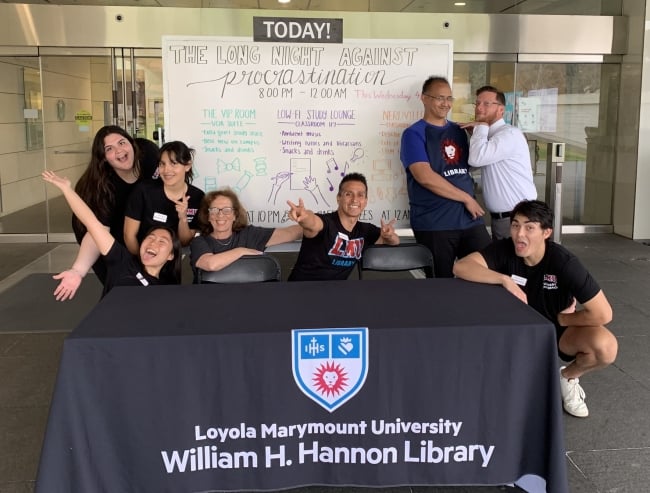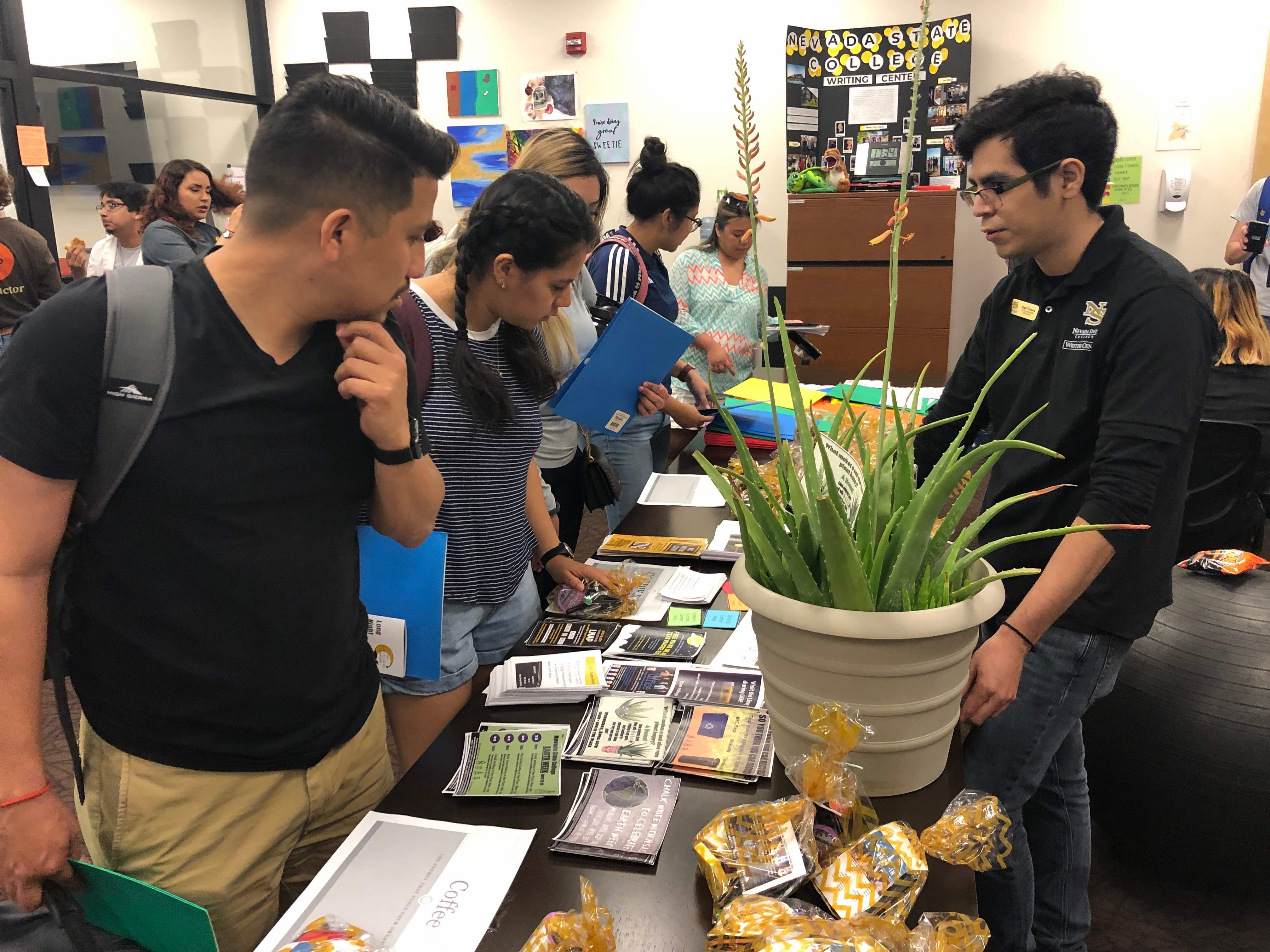You have /5 articles left.
Sign up for a free account or log in.

Raymundo Andrade, center, student engagement librarian at Loyola Marymount University in California, says that the Long Night Against Procrastination studying and tutoring event on his campus historically attracted about 60 students, but attendance numbers are way up post-pandemic.
Loyola Marymount University
One night this spring, on the Wednesday before finals, 200-plus students at Loyola Marymount University in California gathered in the library to access tutors from campus resource centers, get free goodies and eat free pizza. The occasion? Long Night Against Procrastination, or LNAP.
What it is: LNAP started in 2010 as Lange Nacht Der Aufgeschobenen Hausarbeiten at the European University Viadrina in Germany, where writing center staff members rallied to support students seeking all-night help. Now it’s held annually or semiannually at colleges and universities around the globe, typically leading up to finals. Academic resource centers, libraries or both typically take the lead, arranging academic assistance and yes, free food, for students late into the evening.
What it looks like: Loyola Marymount has held LNAP annually since 2015. This spring, students spread out across three main rooms that library staff members prepared and renamed for the event: Nerdville, with computers, whiteboards and science tutors; Low-Fi Study Lounge, with ambient music and writing tutors; and the VIP Room, featuring great views of the Los Angeles skyline.
The event officially ran from 8 p.m. to midnight, but Loyola Marymount students were welcome to stay and study afterward, as the library is open all night ahead of final exams. In addition to pizza, students receive goody bags with school supplies and snacks, plus other freebies.
Getting students to participate: Raymundo Andrade, the university’s student engagement librarian, says that LNAP on campus historically attracted about 60 students, but that attendance numbers are way up post-pandemic. Andrade and his team made a major effort to recruit students this year, including by tabling weeks in advance at campus events and enticing students via giveaway items to scan a QR code to RSVP. They also advertised within the library: in one case, a student library assistant pushed a snack cart around on the day of the event, reminding other students to participate.
Offering food during the event is crucial, but it has to be timed right, says Andrade. Last year when LNAP offered food trucks, some students got grub but never made their way into the library. This year, pizza was served halfway through the event—inside.
The student success link: In addition to delivering late-night tutoring help to students, Andrade says that LNAP helps reduce what’s known in the field as “library anxiety,” or students feeling overwhelmed and confused about using the library and its many resources. At Loyola Marymount, LNAP is part of a larger library program called Feel Good Finals.
“This demonstrates to the campus community, especially students, that the library is always here,” he says. “It’s always present to support them in their academic endeavors and in their personal well-being.”
Andrade adds that much of the student feedback about the event so far has been about feeling like part of a community, which he links to building students’ sense of belonging.
Other LNAP Examples
Roane State Community College: The Tennessee college offers LNAP once each spring and fall at its Oak Ridge campus. Library and learning center staff members, along with faculty and student volunteers, work from 4 p.m. to 9 p.m. to offer students writing and tutoring help. Group and quiet study rooms are available. Professors also may reserve tables to meet with students, including those enrolled in online classes. The event features a popular “goal wall,” where students are encouraged to set and write down goals and post them. Students get raffle tickets for each goal set and achieved. Door prizes are given out twice a night.
Stress-relieving activities include therapy dog visits, lessons in stress relief techniques from physical therapy students and chair massages from massage therapy students. As for food, students get a free dinner, snacks and coffee.
Laura Vaughn, director of library services at Roane State, says, “We do a great deal in one evening. Students love the combination of a festive atmosphere partnered with getting class assignments and studying done.”
Vaughn adds that attendance has slowed since the pandemic, but this spring’s event still managed to attract more than 100 students.
Nevada State College: Full LNAP events happen twice a year, in November and April, from 5 p.m. to midnight, funded by a gift from the Rogers Foundation. The college also holds a mini-LNAP event annually for its Nepantla Summer Bridge program for first-generation students.
Activities include one-on-one support from the Writing Center, Academic Success Center and library staff as well as an open mike with the college’s creative writing club, plus goody bags, T-shirts, pizza and snacks.
Additional activities can include workshops and clothing swaps. Faculty members also may provide office hours. Undergraduate writing specialists play a large role in planning the event. Students helped plan a remote LNAP early in the pandemic, and the event is now hybrid.
Organizers encourage instructors to offer students extra credit for participation and to generally spread the word about LNAP. Attendance numbers range from 150 to 300 students per event.

Rachel Herzl-Betz, Writing Center director, says that LNAP on her campus has always been about “fostering connections and community.” Nevada State serves first-generation students, adult learners, students of color, immigrants “and other students who are working to fight their way out of poverty. Students often have multiple jobs, and it can be hard for them to feel like they’re part of something larger than themselves.”
University of North Carolina at Chapel Hill: The university experimented with late-night study camps for a few years prior to holding its first LNAP in 2016. Currently, the university’s Writing Center and undergraduate library hold LNAP twice a year.
Alex Funt, assistant director of the Writing Center, says, “We offer a supportive study ambience, mini academic and writing coaching sessions and, perhaps most importantly, snacks.”
Between the spring and fall events this past academic year, LNAP saw 562 students. Funt says attendance counts towards the “campus life experience” element of the university’s new curriculum, meaning students get some credit for taking part.
Tell us about your successful efforts to raise awareness of and boost attendance at a campus event.





